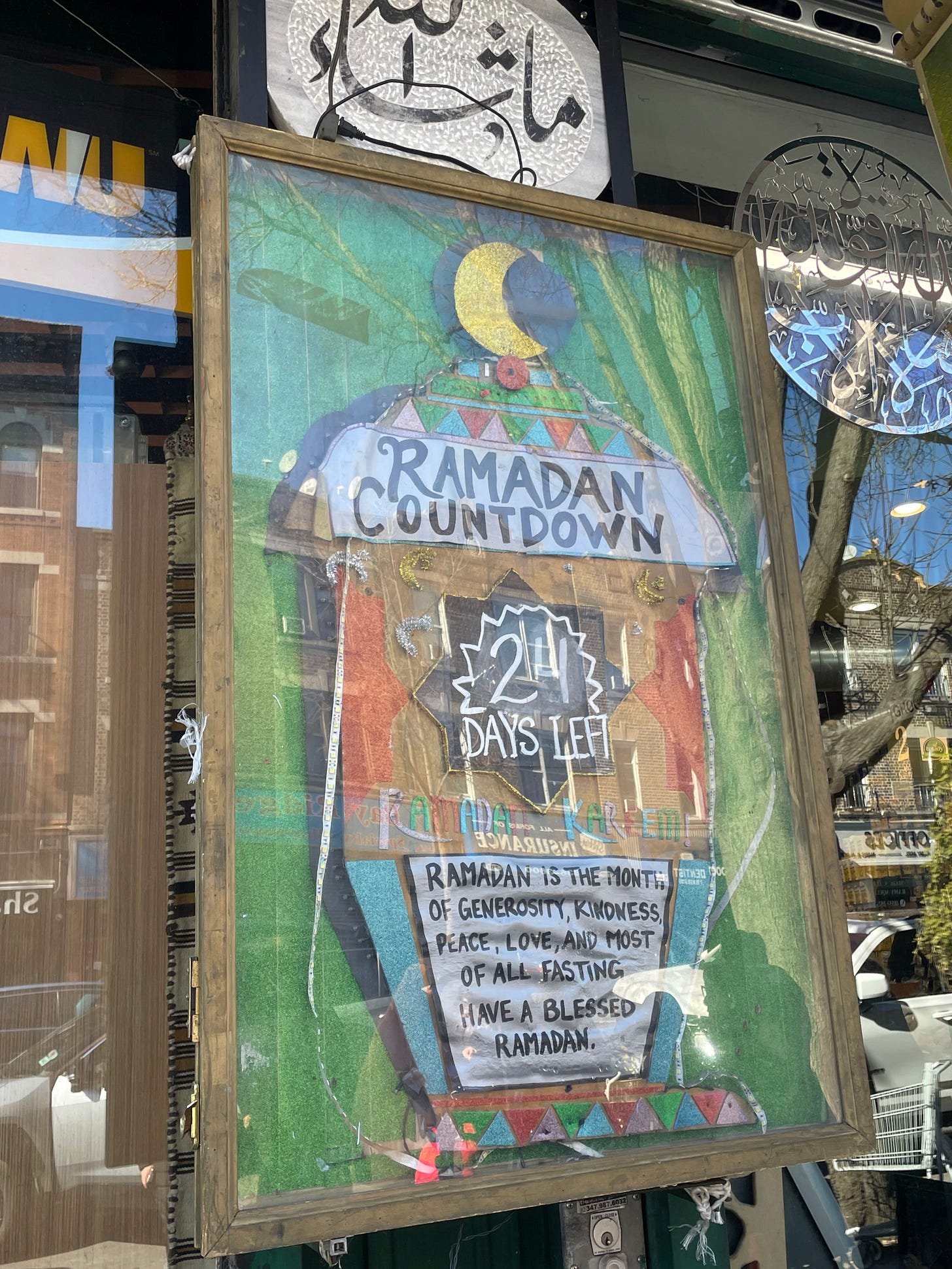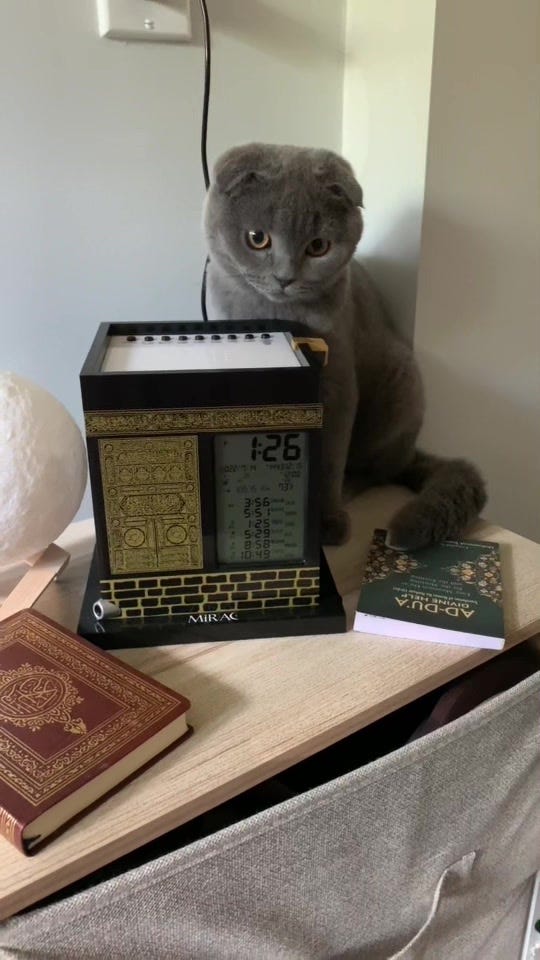Take advantage of our memorial day sale! And hurry up and buy a copy of the zine!
In our podcast episode (our most popular by far) with
, I shared my take on why François, the main character of Houellebecq’s Soumission, was more drawn to Islam than he was to Catholicism:[In Islam] God remains very much beyond humans, very much transcendent. But also [that] the whole idea of submitting to God…like there’s less engagement with the person’s subjectivity…the individual submits themselves completely to God—you can even see it in the way Muslims pray, there's this clear sense of giving yourself completely over to God. There's something very attractive about overstepping your subjectivity when you live in a culture that’s purely subjective and [where] everything’s relative.
Shadi went on to say that I “just made a pretty compelling case for Islam right there,” to which I replied, “I would be Muslim if I didn't believe in the Incarnation.”
I genuinely believe that Jesus was actually God in the flesh, and that he reveals himself through the communion of the Church (most perfectly through the Catholic one). This belief bars me from being a Muslim. I do not believe that Jesus was a human prophet, or that Muhammad is a prophet. I do not believe the Qur’an is the revealed word of God.
And yet, I cannot deny my attraction to Islam.
I will stop short of making an apologia for “Messianic Islam”—namely because such an option is theologically impossible. But I will expound on my attraction to (as well as my reservations against) Islam—which I already began to explain in my pieces on the “queer/Muslim horseshoe” and on why Catholics should fast like Muslims (which you should probably read before continuing here).
But in typical Cracks in PoMo style, my point of departure will not be polemical, but rather metaphysical and aesthetic. In a word, our point of departure is based—in the proper sense of the term. Non-Muslims love to offer moral or political analyses of Islam—whether it’s a “good” or “bad” religion, or if it is essentially “violent” or “peaceful”1—but few of them understand what Islam actually is on an ontological (or aesthetic) level. What are the foundational claims2 of Islam, and what does it have to do with the foundational parts of being human?
This will be the first part in a series of posts about Islam and postmodernism. Forthcoming posts will focus on what both the left and the right misunderstand about Islam and violence, and on Houellebecq, Lindsay Lohan, and Islamic decadence.
{if you are a spergy nerd and want to dig into all the details, make sure to read the footnotes}
The Allure of Submission vs. the Mundanity of Communion
Contrary to the polytheistic pagan culture in which it was revealed, the God of the Qur’an places a strong emphasis on his Oneness. God is purely one, devoid of parts, devoid of blemishes. There is a sense of his absoluteness, of his being complete beyond human logic/standards (to the point that it is inaccurate to refer to God with masculine pronouns, as God transcends the earthly category of gender). Because God is so beyond, he demands the submission of humanity, a total turning over of oneself to his will.
As I indicated above, I believe God became a human and reveals himself today through the communion of the Catholic Church3—not so much because I prefer this claim to that of Islam, but because my experience indicates that it is true. It’s not that I “like” or “agree with” the idea that God reveals himself through a human being, that he comes to us in a form we can comprehend and reaches us “at our level,” is interested in “sharing life” with us and engaging our humanity (our reason, desires, emotions, physicality), offers his mercy to those who are totally unworthy of it (and the byproduct of this—the exhortation to love one’s enemies to the point of dying for them4), and invites us into communion with him and his followers. Rather, I recognize that this is the path God happened to choose to reach us. Thus, this is not a matter of my personal taste taste, but of “facts” (or “events”)—if you will.
As much as I believe in Christianity, I cannot deny that I’m attracted to the path proposed and foundational claims made by Islam. As I told Shadi, there is something very attractive about foregoing one’s “human logic,” one’s subjectivity, and surrendering it completely to this absolute Being who exists on a plane that totally transcends your own. In a sense, it leaves me off the hook from having to engage my subjectivity…from having to do the work, from having to let him—a fellow human—in and see my in all of my woundedness and vulnerability, to allow him in to share life with me. I wish he could stay up there and I stay down here submitting to his will.5
The imperative to submit is alluring, to say the least. It taps into one’s craving for grandeur, for the magical and the poetic. Surely, it is hard to separate Islam from the Arabian culture from which it emerged, with its deep esteem for poetry and story-telling. Part of what’s so alluring is the tension embedded within it—equally ascetic and passionate, spiritual and carnal, restrictive and celebratory.
Take the prohibition of alcohol on one hand and the esteem for sexual pleasure (the discouragement against celibacy) on the other. The harsh punishments prescribed for sins of unchastity, and the reward of sexual pleasure in the afterlife reserved for those who live righteously. The strictness of the Ramadan fast and the indulgent feasting at iftar. The determination to smash pagan idols and the iconoclastic forbidding of depicting the Prophet, and the gorgeous, intricate art and architecture it inspires. The nominalistic, fideistic precedence given to revelation over reason, and the impulse to discover innovations in science, math, and philosophy.
“It is as if Judaism exalts the intelligent and rational aspect of man and Islam, the most immediate and instinctive needs. Instead, in Christianity there is an exaltation of the human in its totality.” -Luigi Giussani
Christianity tends to favor keeping this tension contained, valuing moderation and sobriety, whereas Islam (in my view, as an outsider) allows these conflicting impulses to oscillate. Again, look at the difference between Christian and Muslim fasting, or the intense beauty and invasiveness of the call to prayer (adhan) versus the subtlety of church bells. Personally, I think the way Islam embodies this tension is fascinating (I should also mention that part of my attraction might have to do with Greek Orthodox background, with the influence that Arabic and Ottoman religion and culture has had on it i.e. the tonality of the music, the mystical/poetic imagination, etc), but I won’t deny that there is something very risky about it as well. [More on this in the post on Islam and violence.]
I’ll also add that I find Muhammad’s story6 to be rather relatable—his poetic imagination, his thirst for truth and his frustration with idolatry, his determination to search for the Absolute. I am left to wonder (with all due respect to those who believe him the be the last prophet) what was behind his rejection of the Incarnation…this resistance to being intimate with a God who stoops down to our level…meeting us where we’re at, and this discomfort with imperfections and blemishes…and the sense that the previous revelations were defective or inadequate in some way. Again, I don’t believe he was a prophet. But I find his zeal, his earnestness, his being misunderstood, to be compelling.
A PoMo Islamic Revival?
A lot of fascinating things happening in the Muslim world right now that seems to be flying under the radar.
In response to the spiritual drought in Islam, many are turning to Sufism (no, not the New Age/gnostic kind, but a doctrinally orthodox kind). Take Ramy Yousef and his utterly genius Hulu series, for example. I continue encountering Muslims in the publishing and academic worlds who practice Sufism, who are spiritually and intellectually vibrant people. It also seems that many non-Muslims (like Beyonce and Chelsea from White Lotus 3) are catching on to Rumi’s—the great Sufi mystic—poetry.
There also seems to be a wave of Islamic “postlib” thought entering into the discourse, thanks in part to Houellebecq’s Soumission. While the erratic French writer claims to hate Islam, I can’t help but feel like Houellebecq made an excellent case for an Islamic takeover of the West—one that combines a moderate form of Shariah with Chestertonian distributism. The main characters’ fascination with Islam, Huysmans’s decadent Catholicism (there’s a lot to be said about why he, unlike Huysmans, could not accept Christ as savior, but could warm up to prospect of submitting to Allah), and Nietzsche highlight the Dionysian energy contained within Islam, which I alluded to above as well as in the queer/Muslim horseshoe piece and the one on the Bimbo Summit, in which I attempt to draw out the thread linking Lindsay Lohan’s decadence, her Carmelite/Teresian kenosis, and her conversion to Islam.7 More on this in the post on Islamic decadence.
Even cats like Sister Minnie are popularizing Islam on social media.
Perhaps this means it’s time for Dimes Square to ditch Catholicism and convert to Islam? (only half joking)
In all seriousness, several of my students have expressed to me that they feel disillusioned with Christianity…feeling that too many Christians and Christian institutions “water down” their faith and have an overly accommodationist attitude toward the increasingly secular, individualistic, and indulgent direction society is headed in, and that Islam offers a much more robust alternative to it. It’s much more demanding, it’s more distinct. As much as I think these are not really good reasons to follow any religious path, I can’t deny that they have a point. See more on this in my piece on Ramadan.
For further reading…
First of all, read the Qur’an. Don’t step to me with your ingenious analysis of Islam if you’ve never read it.
This happens to be my fav passage:
And never say of anything, “I will definitely do this tomorrow,” without adding, “if Allah so wills!” But if you forget, then remember your Lord, and say, “I trust my Lord will guide me to what is more right than this.”
-Surah 18:23-24 (The Cave)
To understand Islamic theology and spirituality, read
Al-Ghazali
Ibn Rushd
Rumi
Hamza Yusef’s Purification of the Heart
For analyses of Islam and the modern world, read
Fr. Samir Khalil Samir SJ’s 111 Questions on Islam (literally one of the most intelligent books I’ve ever read on Islam)
Dr. John Azuma’s essay on Islamic jurisprudence
Esme Partridge’s essays on Islamic spirituality, liberalism, and social media
Everything by Shadi Hamid (his Substack, Atlantic articles, and his book The Problem of Democracy)
Baudrillard and Zizek’s books on 9/11
I find the ways most Catholics engage with Islam to be annoying. Again, it’s usually moralistic or polemical. The conservatives resort to apologetics, trying to prove who Muhammad was mentally unstable, possessed, or a plagiarizer, and pointing to all of the ways that Islam insights violence (though I give people who grew up in Islamist societies who converted to Christianity due to their suffering—like Arysan Ali—a pass for this kind of rhetoric). The liberals try to point out all of the similarities between Christianity and Islam, and celebrate all the nice peaceful Muslims.
But this is boring, as none of this gets to the root of what Islam actually is—and what is most interesting about it. I don’t care about the “good” or “bad” aspects. How does it actually help people grow closer to God in their experience? How does God use the insights of Islam to reach people? What is most fascinating and beautiful about it? I’m interested in lived Islam as it pertains to the soul, to human experience—more so than Islam on paper or as an abstraction.
Side note: As much as I think Pope Benedict’s comment on Islam being “spread by the sword” was imprudent and a bit reductive, I think his overall engagement with Islam is much more interesting and coherent than Francis’s—not because he’s unafraid to say politically incorrect things about Islam, but because he’s more willing to engage it on a foundational, ontological level, compared to Francis who uses a very sentimental, sociological approach that waters down Islam and thus does it a disservice. I feel the same way about how Francis treats homosexuality—as a matter of identity, and thus superficially, compared to Benedict who engages the real substance of homosexuality and thus does more justice to it—which is part of why I wrote that Benedict is more of a gay icon than Francis (also why most people don’t understand the queer/Muslim horseshoe). Still, I think Francis has done more to enable Christina-Muslim dialogue and collaboration (in the spirit of his namesake).
Also as much as Christianity is much more tolerant of homosexuals and provides more spaces for them to integrate themselves into the life of the Church, there is a certain overlap between the Dionysian energy within Islamic spirituality and certain iterations of gay culture. More on this in the Queer/Muslim horseshoe piece.
I don’t believe Muhammad was a prophet or that the Qur’an was divinely revealed. I also don’t believe (as one very trad cath follower once insisted to me) that it was revealed by the devil. I believe it was the invention of a very intelligent, creative, and spiritual human being. As a human invention, it has some genuine insights that are the fruit of Muhammad’s reason, which the Holy Spirit can certainly use to bring people closer to God. But it also contains some serious errors—also the fruit of Muhammad’s reason (which was limited due to original sin)—that can be used by darker spirits to lead people astray. [This isn’t to say that elements of Christianity can’t be used by the devil to lead people astray. But I’d say that this is a deviation from the essence of Christianity, more bug than feature. Similarly, I believe the violence in the name of Christianity is more bug than feature—though I also believe that Christianity—while encouraging and enabling people to live peacefully—is NOT a pacifist religion.]
In my readings of the Qur’an, Hadith, and Islamic theological texts, I consistently find emphases on God’s mercy. The invocation used to begin prayer calls to mind that God is “almighty” and “all merciful.” Yet as a Christian, I can’t help but feel like the way mercy is conceived in Islam is rather limited. God is merciful, but up until a certain point; he forgives those who ask his forgiveness, but things are quite different for those who refuse to repent. Ratzinger often emphasized that the Crucifixion reminds us of God’s “exousia”: his coming out of himself,—his transcending the boundaries of “logic”—to pour out his love and mercy on us. Thus, the numerous instances in which Jesus went out of his way to pursue sinners, including those who were unrepentant.
The paradigm of forgiveness in the Qur’an usually begins with the initiative of the repentant sinner, rather than God’s initiative…which is to say his desire to go out of his way to win over the sinner. This is because God sees in the sinner the potential to become a saint, sees a glimmer of the desire for repentance hiding underneath the rubble of their stubbornness. This is where the teaching to love one’s enemy and to turn the other cheek comes from. Everyone is a potential brother or sister in the Body of Christ. If there aren’t in communion with us now, we ought to pray—and go out of our way to love them—in order to draw them closer into this communion.
In general, Christianity proposes that in the face of sin, blasphemy, or persecution, the follower of Christ is called to follow his example and love the enemy to the point of dying for them—with some exceptions given Just War theory. Things vary more in Islam. First of all, it’s not always clear who the enemy is: more generous strains of Islam will include the People of the Book among the true believers, others will recognize them as fellow monotheists but will require them to pay a jizya tax, others will deem them infidels…and other will deem fellow Muslims who don’t believe in their version of Islam to be infidels. In its more Aristotelian and modern iterations, there are stronger restrictions against the use of violence against “enemies” (whether political or religious).
This is a point that keeps coming up in Hamza Yusuf’s commentary on Imam al-Mawlud’s Matharat al-Qulub. He often hints that Christianity’s understanding of God’s mercy is too excessive, and that Islam balances God’s mercy with his justice. There is certainly something scandalous about Christianity’s understanding of mercy…it’s belief that God is both three and one, that the perfect, almighty deity entered imperfect, fragile human flesh, that Christian celebrates celibacy—especially when we look at it through the eyes of “human logic.” For that matter, I can’t blame Francois of Houellebecq’s Soumission for being repelled by the impotence, the “femininity” of Christianity and the monks at the monastery he visited.
But the point I’m trying to make is that Christianity places great emphasis on the imperative to forgive unconditionally—to the point of death…whereas in Islam—due to both its theology and the example of Muhammad—mercy tends to be more conditional. This is a nuanced point that we need to take into account when making sense of violence committed in the name of Islam.
There’s this sense of God being mysterious, about the relationship not being about you, but about the vastness of his mystery. There’s a gnostic tendency of mystical Islam, especially in the esoteric renderings of Sufism that veer toward the ideal of self-annihilation, which sounds almost Buddhist.
As much as I think she was attempting (in vain) to construct a modern liberal depiction of Muhammad, I can’t deny that there is indeed a lot of value in Karen Armstrong’s biography of him. Although she glosses over the darker elements of his story (and of Islam), she succeeds in highlighting some of his most human attributes.
A few months after the Bimbo Summit, the paps snapped a shot of Lohan passed out in her car. Soon after, a meme began floating around the internet that juxtaposed the image of Lohan with that of Gian Lorenzo Bernini’s sculpture of Saint Teresa of Avila in ecstasy. This meme unveils how celebrity culture not only “mimics” religious ecstasy—as Hilton put it—but inverts it. Rather than leading a person’s soul into union with the divine, it momentarily lifts it into the heights of glory only to plunge it quickly down into a dark abyss.
Nine years later, the rumor mills started claiming that she had converted to Islam as pictures emerged of Lohan wearing a burkini and carrying around a copy of the Qur’an. While some found this assertion laughable, I found it to be quite fitting. Islam imagines a God who is absolute Other and who completely transcends the human realm, asking our complete submission to him. Further, Islam vehemently rejects the prospect of idolatry to the point of extreme iconoclasm. Is it any surprise that such a religion would appeal to someone whose life has been ravaged by the idolatrous cult of celebrities?










Long-time reader, though I know I rarely comment. Still, there's a lot here, I'm really grateful for the thoroughness, generosity and as always appreciate your warmth, rigor and wit. But I have to say, a lot of this seems to hang on a particular description of God, namely how Islam understands the Divine, except that I don't recognize the theology here. Myself included, but additionally at least the Muslims I know, read, and study with, wouldn't recognize this conception of Divinity, either. Consider this passage
"As much as I believe in Christianity, I cannot deny that I’m attracted to the path proposed and foundational claims made by Islam. As I told Shadi, there is something very attractive about foregoing one’s “human logic,” one’s subjectivity, and surrendering it completely to this absolute Being who exists on a plane that totally transcends your own. In a sense, it leaves me off the hook from having to engage my subjectivity…from having to do the work, from having to let him—a fellow human—in and see my in all of my woundedness and vulnerability, to allow him in to share life with me. I wish he could stay up there and I stay down here submitting to his will"
...
The idea that Islam requires us to forego our "logic" and "subjectivity" is itself a cliche, but arguably is just as true of Christianity (the Trinity, after all, is hardly more "rational" or "logical" than unitarianism). In fairness, after all, I could ask why God needs to be human in order to see our woundedness and vulnerability; difference from God does not imply distance from God. Yes, we believe God is above and beyond us, but that does not mean God is not with us, intimately aware of us, present with us at all times; from the folk wisdom of Islam to the deepest traditions of the normative period of the faith, no Muslim believes God is far away, indifferent to her, unaware of her, or not intimately concerned with her life
There seems to be a confusion of a kind here, a partial understanding of tawhid that needs to be engaged--because God transcends our material realm, and is apart from it, does not mean God is remote; we as Muslims believe God transcends time and space. To believe this implies distance, however, is to reintroduce time and space precisely after God denies these categories are relevant. Nothing can contain God, the Islamic tradition teaches... which is where the above seems to stop, forgetting that there's more to this specific tradition: "except the heart of a believer."That, however, is the part I'm not hearing. In other words, we as humans can and must let God in, as Muslims; more to the point, God being God, God is already "in".
We either come to terms with that or we do not, whoever we are and however we are. But none of this warmth, intimacy and presence are found above, conveying a rather dated perspective on Islam, that in fairness some Muslims also hold to, but I hardly think this is due to deep reading and more because we wander through the detritus of our tradition, often picking at the pieces we can find, the larger narrative inaccessible. Of course, if I'm misunderstanding your point, let me know. Maybe this works better as an in-person conversation, but I thought I'd at least raise some immediate reflections and concerns
Imagine if a Christian in the Roman Empire wrote an essay titled "confessions of a wannabe pagan" where they frothed at the mouth about the "beauty", "ritual", and "spirituality" of the Roman cult. All the while their brothers and sisters in Christ were being persecuted and murdered by the pagans. This is no different to what you are doing. Our fellow Middle Eastern brothers and sisters in Christ are currently being persecuted and murdered in Muslim countries. Don't talk to me about how "appealing" Islam is to you when it has been the cause of so much of our suffering and martyrdom.
Every time you froth over your "attraction to Islam" you are doing nothing more than celebrating a disordered inclination towards heresy. Islam, which is a religion that denies the divinity of Christ, His incarnation, His passion, and glorious resurrection, is simply and obviously not of God, and you cannot talk about "lived experience" as if it somehow is relevant to objective and dogmatic Truth. Despite how "orthodox" you try to appear you seriously sound like the "spirit of V2" "interfaith" libs (Rohr, Kung) when you spouse nonsense like this. Even pagans and witches have forms of "mysticism", and some aspects of what they practice ("lived experience") are superficially and aesthetically appealing. But that will never change the fact that they worship false gods and idols. In a similar way, Islam worships a false god that is identified by "oneness", which is completely anathema to revealed Truth. And it's not a little difference. It has everything to do with the fundamentals, which I'm sure you know. The problem is, how can you be so conciliatory to what is plainly not of God? Catholics have never conciliated evil.
Then you say, "I don't care about the good or bad aspects" and complain about "moralizing Catholics" without actually providing a reason why it is wrong to be concerned with morality in this very important question. Do you not see how problematic this is? Whether you admit it or not, you are subtly relativizing religious truth, pretending that its "aesthetic and ontological" aspects are in any way relevant, while being intentionally vague and opaque about it.
You're a Catholic, not a "wannabe Muslim". This isn't a light matter. Get your head out of the clouds and stop flirting with heresy.